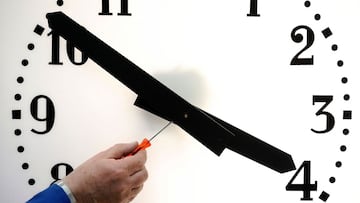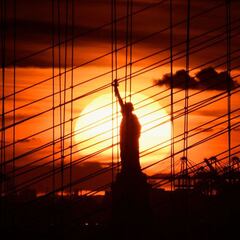Daylight saving time: Does the clock move forward or backwards? Do we lose or gain an hour of sleep in November?
Taking place on Sunday, 2 a.m, Daylight Saving is upon us once again and many have the same question in mind: Does the clock move forward or backward?

Daylight Saving Time (DST) is back once again, so if you are in the Eastern, Central, Pacific or Mountain time zones remember to change your clocks Saturday night!
The idea is simple: longer days in the summer, shorter days in the winter by setting the clock an hour forward or backward.
The DST is mostly credited to Benjamin Franklin, who came up with the idea in 1784 in order for people to have an extra hour of sleep when the vast majority of workers were involved in Agricultural labor.
It's that time of year again to adjust your clocks! Daylight saving time is coming to an end. Don't forget, we "fall back" an hour tomorrow morning at 2 a.m. @news10nbc pic.twitter.com/zfNq4suDkJ
— Raven Brown NBC12 (@RavenTiaraBrown) November 6, 2021
See also: Could a high-protein diet help you get a deeper sleep?
Do we lose or gain an hour?
Daylight saving time happens twice a year: March and November. In November, the clock moves back an hour to increase the time of daylight in the fall and winter mornings. While in March DST will move the time an hour ahead, to increase the daylight time in the afternoons.
However, there is not an exact answer on whether an hour of the day will be gained or lost, as it all varies depending on one's perspective. For those who see the change as gaining an "hour of sleep," this is true in November. However, for those look at DST from the day's perspective, they are losing an hour of the day.
When will Daylight Saving Time happen?
For states that observe DST, it happens on the first Sunday of each November. This year, clocks will need to be changed on Sunday, November 7, at 2 a.m. Therefore, at 2 a.m. Sunday, it will be 1 a.m.
Most smartphones and electronic devices change their times automatically, however, for watches and clocks, people will have to change their times manually. If you are worried about running late on Sunday, it is advisable that you preempt the change by shifting your clocks on Saturday night, because who wants to wake up at 2 a.m. to fix their timings?
Don't forget that Daylight Saving Time ends tonight, so set that clock back an hour before you head to bed!
— NWS Bismarck (@NWSBismarck) November 6, 2021
Sunset times tomorrow:
Bismarck: 5:18 PM CST
Jamestown: 5:10 PM CST
Minot: 5:17 PM CST
Williston: 5:26 PM CST
Dickinson: 4:26 PM MST
source: https://t.co/4ZcuyhTouL
The time zone math
As the US has different time zones, times will be switching at different times, depending on the time difference of each state.
Related stories
The East Coast is three hours ahead of the Pacific time, two hours ahead of the Mountain and one hour from Central, which means the East Coast will be the first to switch their times for DTS.
On Sunday, 2 a.m. ET, it will be 11 p.m. in California, midnight in Colorado and 1 a.m. in Louisiana.


